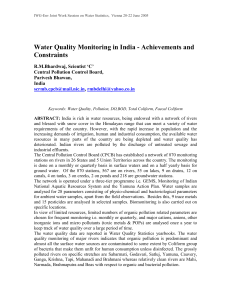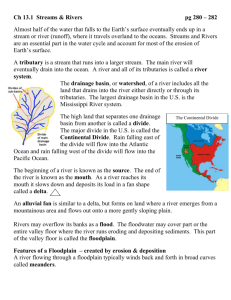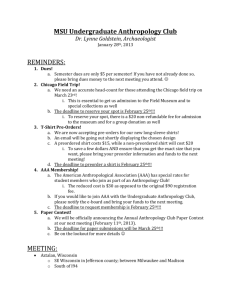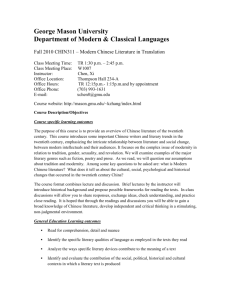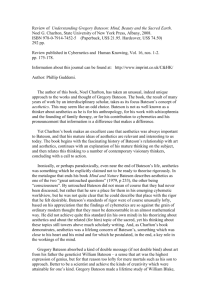Annotated Bibliography
advertisement
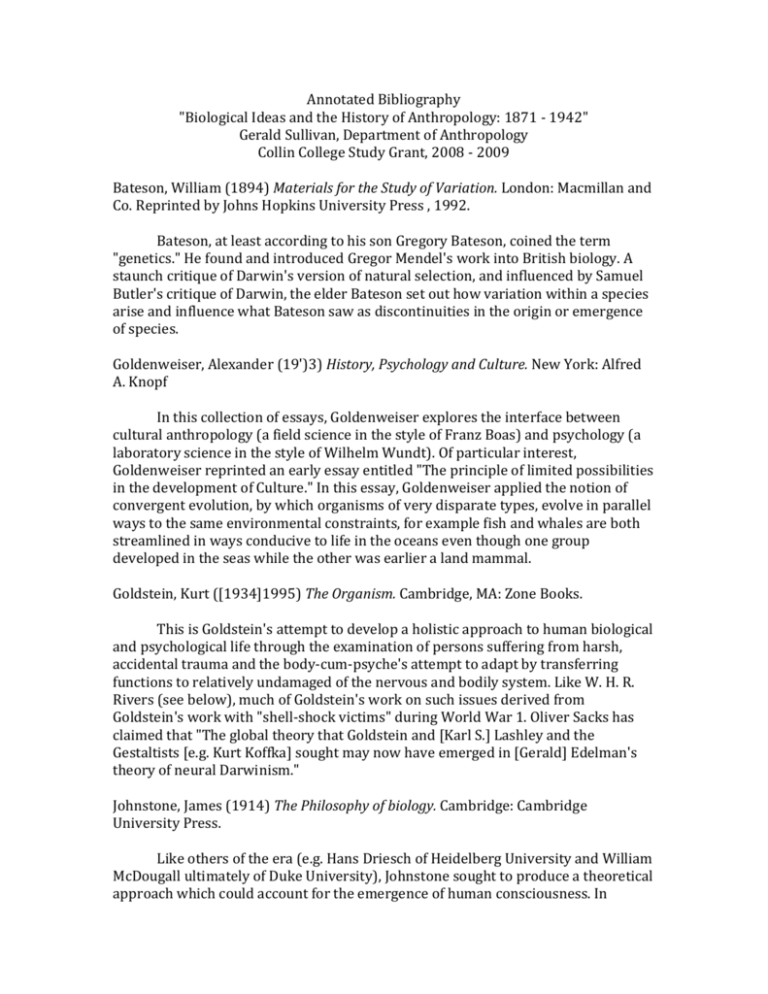
Annotated Bibliography "Biological Ideas and the History of Anthropology: 1871 - 1942" Gerald Sullivan, Department of Anthropology Collin College Study Grant, 2008 - 2009 Bateson, William (1894) Materials for the Study of Variation. London: Macmillan and Co. Reprinted by Johns Hopkins University Press , 1992. Bateson, at least according to his son Gregory Bateson, coined the term "genetics." He found and introduced Gregor Mendel's work into British biology. A staunch critique of Darwin's version of natural selection, and influenced by Samuel Butler's critique of Darwin, the elder Bateson set out how variation within a species arise and influence what Bateson saw as discontinuities in the origin or emergence of species. Goldenweiser, Alexander (19')3) History, Psychology and Culture. New York: Alfred A. Knopf In this collection of essays, Goldenweiser explores the interface between cultural anthropology (a field science in the style of Franz Boas) and psychology (a laboratory science in the style of Wilhelm Wundt). Of particular interest, Goldenweiser reprinted an early essay entitled "The principle of limited possibilities in the development of Culture." In this essay, Goldenweiser applied the notion of convergent evolution, by which organisms of very disparate types, evolve in parallel ways to the same environmental constraints, for example fish and whales are both streamlined in ways conducive to life in the oceans even though one group developed in the seas while the other was earlier a land mammal. Goldstein, Kurt ([1934]1995) The Organism. Cambridge, MA: Zone Books. This is Goldstein's attempt to develop a holistic approach to human biological and psychological life through the examination of persons suffering from harsh, accidental trauma and the body-cum-psyche's attempt to adapt by transferring functions to relatively undamaged of the nervous and bodily system. Like W. H. R. Rivers (see below), much of Goldstein's work on such issues derived from Goldstein's work with "shell-shock victims" during World War 1. Oliver Sacks has claimed that "The global theory that Goldstein and [Karl S.] Lashley and the Gestaltists [e.g. Kurt Koffka] sought may now have emerged in [Gerald] Edelman's theory of neural Darwinism." Johnstone, James (1914) The Philosophy of biology. Cambridge: Cambridge University Press. Like others of the era (e.g. Hans Driesch of Heidelberg University and William McDougall ultimately of Duke University), Johnstone sought to produce a theoretical approach which could account for the emergence of human consciousness. In Johnstone's case, this attempt required a marriage of Aristotle and modern biological findings. Like the others mentioned here, Johnstone sought to avoid a reduction of mental life to mere materialist or biological underpinnings. Kempf, Edward J. (1920) Psychopathology. St Louis: C. V. Mosby Co. Kempf attempted to describe the range of psychopathological symptomology in what must be considered one of the monuments of early twentieth-century psychiatric exposition. In one direction, Kempf attempted to tie such symptoms to the workings of the autonomic nervous system, this being the subject of Kempf s A utonom ic functions and the personality of 1918. Among other noteworthy notions, Kempf suggested that many persons diagnosed with dementia praecox (now called schizophrenia) suffered not form homosexuality per se but rather from the fear of being discovered to harbor homosexual tendencies; this view has come to be associated with Harry Stack Sullivan. Kretchmer, Ernst (1925) Physique and Character. New York: Harcourt, Brace and Company. This book is one of the most important works on the possible relations between body type and tendencies towards certain, specifiable sorts of psychological disorder. Kretchmer discovered, that at least for population in Germany, that persons diagnosed with dementia praecox (now known as schizophrenia) tended to be small, thin and wiry while those diagnosed with (now called bipolar disorder) tend to be larger, more rotund or rounded figure. Whatever one might conclude about Kretchmer's work, his efforts like those of many other psychologists, neurologists and philosophers make the account of normal social science provided by evolutionary psychologists untenable. McDougall, William (1929) Modern Materialism and Emergent Evolution. New York: D. Van Norstrand Co. In this short and largely trenchant book, McDougall demonstrates that the sort of materialism which emerged during the enlightenment (e.g. La Mattrie's Man, a machine of 1748) cannot possibly account for human consciousness. Further, modem materialists following from Darwin were, according to McDougall, increasingly aware of this problem. Unfortunately for McDougall, his attempt to make a positive case for the powers of emergent evolution lead him to take up the possibilities suggested by research into extra-sensory perception and life after death; this left McDougall open to ridicule. Rivers, W. H. R. (1922) Instinct and the Unconscious, 2 nd Edition. Cambridge: Cambridge University Press. Though trained as a neurologist, a noted performer of psychological experiments and an early practitioner of anthropological fieldwork (see his, The Todas of 1906), Rivers served in the Royal Army Medical Corps as a psychotherapist during World War 1. In this book, Rivers attempted to provide an account of the instinctive pressures which, under the influence of the chaos of the western front, gave rise to the presentation of the psychological symptomology identified as "shell shock." Additional, Rivers provided a respectful and largely supportive criticism of the theories of Sigmund Freud. Notably Rivers differed from Freud by contending that these symptoms could not be traced to the erotic life, but could be to the tortures of an instinct to survive in a chaotic and dangerous universe of trench warfare. Rivers also rejected Freud's notion of the censor. Rivers further developed his theory in a series of essays and presentations published posthumously.




